#Tepwat Manu
Explore tagged Tumblr posts
Text
Chapters 2 and 3 of Tepwat Manu are live on ao3!!
U can get there from the pinned post on my blog
Two old friends from faraway lands come to declare their devotion, a foolish youth is abducted, and our travelers embark on the titular Journey to Manu !
I'll be celebrating with two suns from the watercolor edition of the book I'm still working on
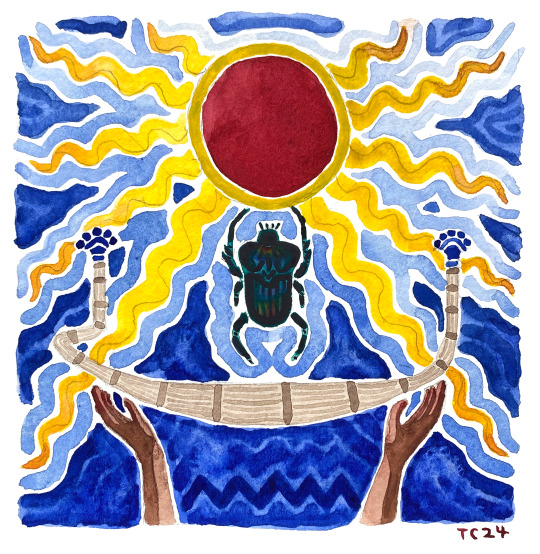
Here is Khepri reborn, held afloat by grandmother Nun, the primordial sea.

Here is Shamash, radiant.
Hope u think this is cool :3
#my writing#my art#Artists of Tumblr#Ancient Egypt#Ancient Mesopotamia#Original Work#Tepwat Manu#The Journey to Ilvelinir#Fantasy
26 notes
·
View notes
Text
Tepwat Manu is a fantasy story I’m writing - inspired by Ancient Egyptian and Mesopotamian mythology!
Im working on watercolor illustrations as well so I can make it into art book to print on demand
I’m waiting tables to pay the bills in the mean time, I don’t make any money from this
I am being so serious when I say: if you have the financial and time privilege to get a group of friends together and make an indie project, PLEASE do. Indie games, indie animations, indie comics etc etc
the art industries are kind of in the shitter. It’s not so much because of AI (though that doesn’t help) but because studios just aren’t hiring people and funding projects anymore. People who’ve been in the industry for decades are finding themselves struggling, and once you have a mortgage or kids it’s harder to do something as risky as making something on your own.
completing projects is hard. it takes a lot of time and effort, and most people can’t afford it. so if you CAN afford to make art, even at the risk of no financial gain, I strongly encourage you to be as resilient as you can. We’re at a point where these industries are not going to turn around by themselves, and waiting for jobs to open up again in order to get experience and portfolio work might not be realistic.
people have been making art and telling stories longgggg before we were getting paid for it, and people aren’t going to stop just because no one has hired them to do so.
for everyone else: support indie artists when you can!!!! That person who made that cool indie game or youtube animation or webcomic might be doing this full time! your support might be the only reason they’re able to keep doing it.
and if you have already started an indie project: you’re so brave and I’m very proud of you!!! in fact, drop a link to it in the reblogs if you want! 👇
24K notes
·
View notes
Text
Chapter 5 is live on ao3 !
-in which our protagonist goes into the marsh with an unlikely travel companion, and confronts and old enemy. (link in my bio, yadda yadda) Trigger warning: Yitties
Here is Biati, our protagonist. She's pondering the burn on her arm which spells her doom, which incited the happenings of this story. Unlike Anekh, she does not look very much like my brother. Her robe is draped and tied in a New Kingdom Egyptian fashion, characteristic of royal women. She wears a broad collar of gold, with bangles, rings, and earrings, all ornamented with turquoise and lapis lazuli. her hair covering is a more humble version of the famous pharaohs' striped Nemes. Music credit to the inimitable Leonard Cohen. Rest in peace, old man.
#my writing#my art#ancient egypt#ancient mesopotamia#tepwat manu#the journey to ilvelinir#artists of tumblr#watercolor#time lapse#yitties
5 notes
·
View notes
Link
I’m posting my story on ao3! Just put up the first chapter.
If u want u can follow my art account on insta @ Wolgraugorimilir
https://www.instagram.com/wolgraugorimilir/
#My Writing#Original Work#Tepwat Manu#The Journey to Ilvelinir#Ancient Egypt#Ancient Mesopotamia#Fantasy#Ancient History
4 notes
·
View notes
Text
A letter to Deborah
Deborah is a Christian theologian, and a friend of the family. She took an unexpected interest in my writing, and we've been going back and forth about God. I'm going to share my letters, because I put a lot of thought into writing them. (and I love to muse about God and Mesopotamia)

Deborah,
Thank you for deciding to say something when you were unsure. I consider that a great compliment, as I strive for openness with all my relationships.
I apologize for my ignorant comments about Jesus. Truth be told, I never expected that any Christians would want to read my writing. (I certainly never expected to open a dialogue with a theologian). I'll go back in and soften my language, because I don't want to alienate anyone who would otherwise respond.
"I further dare to say that you don't know Him at all, because then you wouldn't hate him. Not possible... I wonder if, when your little brother died (and believe me I would not for worlds discount by an atom the terrible tragic significance of that in your life) some well-meaning person told your aching, bewildered, grieving self that "Jesus wanted him for Himself" or some other pernicious nonsense? Have you always blamed God for that loss?"
I agree that I don't know Jesus. I never tried to understand Him. I can't remember much about my childhood, but I remember thinking of Jesus as something certainly real, but confusing and vaguely malevolent. I can't remember how people talked about Henry's death. I remember that it quickly became something taboo. We didn't say his name.
I think the bitterness came later. Jesus transformed into something Hideous to me slowly, as my social consciousness developed, and as the resultant horror caused by christian nationalism and white supremacy became tied to His name.
I've never been able to separate the two things: The Jesus that Was, and the Jesus that became the rallying cry for genocide. This is partly because I feel that there's not a meaningful difference between intention and effect. (I've only ever been hurt by people who Meant Well).
"Anyway, dear Toni, this is not a rebuke from an offended believer, but real concern for your deep wound, and deep hope that you can find someone with whom to unpack this "bitterness" and "hate," which will infect your own spirit if you let them."
Thank you Deborah. Your genuineness reads. I unlearn my hatred a little bit with each conversation like this one, and by writing this bitter little story.
Mesopotamians were bitter people too. If you'll humor me, I'd like to share one of my favorite poems, The Story of Adapa:
Adapa is a sorcerer. He attains power to rival the gods through his wit and will, but he is a servant of Ea, the god of Waters, and Wisdom. Ea summons Adapa to heaven to answer for a magic spell which went too far. Through a series of psychedelic trials, Adapa is tricked. He could have reached out and taken that which would have made him a god, but he chooses not too. He despairs when he realizes his mistake too late. He is bound in service to Ea forever. The gods laugh.
If there are gods in this world, I think this is how they would act.
It feels cathartic to tell that story. I can picture the farmers who told it. Their teeth are rotting. There are parasites in their blood. They toil for cruel masters.
Sheesh. Welp. Keep it pushing. We don't have it THAT bad.
"Pray to Osiris if that helps...God is remarkably tolerant."
Maybe I will! I haven't tried to pray in a long time.
Thank you again for your wise words. I will always cherish our correspondences, and muse on them when life is kind enough to allow me to write. I would welcome your prayers! Send baby Henry my finest regards, if you can get in touch!
Blessings from a dirty apartment in Minneapolis,
-Toni (I also go by Maeve)
4 notes
·
View notes
Text
Chapter 4 of Tepwat Manu is live on ao3 !!
In which a foolish youth is spirited away into the marsh, and is saved at the last minute by a princess from a faraway land.
To celebrate, Here's the first of my character portraits: Anekh, a foolish youth. By complete accident he looks exactly like my brother if my brother was an ancient Egyptian noble (sorry Nate 😂) Anekh is dressed like royalty from the New Kingdom Period. He's wearing a pleated linen shendyt skirt, a broad-collar with gold, turquoise, and lapis lazuli beads, a headband, and his mother's cylindar seal - for making signatures on clay. (For my history-enjoyers, cylindar seals were more prominant in Mesopotamia, where writing was impressed into clay. Anekh is wearing that seal because Tepwat Manu's setting reflects the 10 years of Esharhaddon's conquest of Egypt during the Late period. During that time, Egypt was controlled by the Assyrian empire, who imported Mesopotamian culture (and people) en masse.) Anekh's head is shaved except for the sidelock of youth above his right ear. Historically, this style was reserved only for the children of Pharaohs, the legitimate heirs to Osiris, but in my story, its is just rich-people fashion. Anekh hasn't ever had to work in his life, and now he's due for a rude awakening from the world. Poor bastard. Music is Robot Tune by French class - shoutout to Drue Langlois who makes the Dudes of Hazmat on Youtube - I got this song from the toxic waste chase, which kicks ass.
#Tepwat Manu#Ancient Egypt#Ancient Mesopotamia#My Art#My Writing#Artists of Tumblr#Watercolor#Time Lapse#I like when the music gets all computer-y when I'm painting the heiroglyphs feels very fitting lol#The Journey to Ilvelinir
3 notes
·
View notes
Text
Chapter 6 is live on ao3 !!!
In which unlikely companions are forced to get along, and in which something was taken that was not given. This was a tricky one to finish, but I'm happy w it. Here is Nakru, whose name means Enemy - an immortal jinn, and the lord of ANGST.
"He was cloaked in the wind which heralds a storm, and cowled beneath the shadow of a new moon." More plainly - He's wearing a tunic and shawl of a Neo-Assyrian royal style, and he carries his starmetal sword tucked into his belt. His dark painted nails are historically accurate! The oldest manicure sets were found among battle gear in the graves of ancient Mesopotamian warriors, who painted their nails black or green to look fearsome. I got to break out my Akkadian cuneiform for this one, hope u think it's cool!
#tepwat manu#the journey to ilvelinir#ancient egypt#ancient mesopotamia#my writing#my art#artists of tumblr#watercolor#time lapse#if you can't tell i love this guy he's such a piece of shit
2 notes
·
View notes
Text
Let it NEVER be said
that crippling self-doubt can hold me back. for more than 6 months at a time. Chapter 9 is up It's probably for the best. I think I have to live a little to have anything to write about. and I have to kill the parasites in my brain telling me it's ok to neglect my life as long as I'm writing. While this was on hold, I got my writing fix with verbose hot takes on goodreads. In this chapter, Haerharu and Waradum visit a city. Inquire within to enjoy some purple prose about god.

love y'all. Hope you're well, it's rough out here.
#Tepwat Manu#The Journey to Ilvelinir#Ancient Egypt#Ancient Mesopotamia#My writing#My art#Watercolor#In which Waradum fights for his life against eye contact for like 4 weeks
1 note
·
View note
Text
Letters to Deborah
(this is technically not a letter to Deborah, but to a different reader. Since its in the same vein of musings about my writing, ancient history, and life on Earth, I'll keep it as part off this little series.

The reader said:
"A great person is someone who knows that there is something bigger than this little self. The little self that wants to eat and be comfortable, trying to build itself up and always worried about it's place in the pecking order. Not sure how these guys can be compelling in this regard if they think that this little person is all they are!"
I responded:
I disagree.
I think I ~want~ this story to be about "little selves." I hold a great amount of fondness for our "little selves." The people who I admire most aren't anything bigger than what they are: an animal making the best of a tragicomic life.
This comes from my worldview. I don't believe that we are anything greater than funny little idiosyncratic animals making the best of a pretty raw deal.
In this story, I hope I can depict the dignity and strength of our "little selves." After all, ~most~ people ~are~ our little selves. We have mouths to feed, dead to mourn, people to love. We don't have the time or the money to be bigger than what we are. We live with our necks bent to the earth, like our ancestors have for thousands of years.
This is why Haerharu and Waradum are earnestly foolish, and desperately, illogically devoted. They're not heroes, they're people.
0 notes
Text
Chapter 8 of Tepwat Manu is live on ao3!
In which our protagonist muses about regret, and in which there is a contest of strength. Unrelated to the story, here's some viking gods! I drew these for a friend.
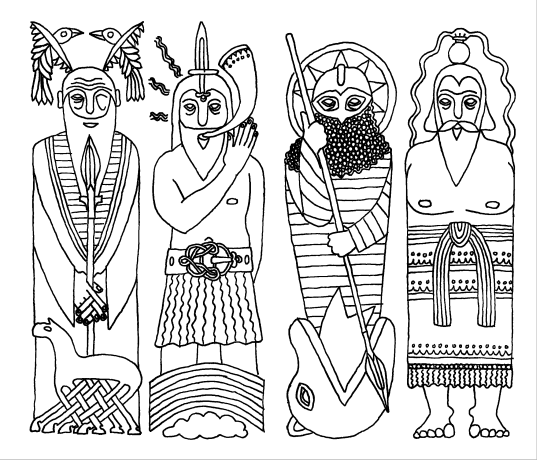
From left to right: This is Óðinn. He is the Gallows God, The Masked One, Wanderer, Lord of Frenzy. He is the god of Wisdom, who hanged from the World Tree for nine nights, and was pierced by his own spear. In a trace, near death, he traded his eye for wisdom, and at once, the rune-letters were revealed to him, carrying the knowledge of Seiðr - women’s magic - and the gift of foresight. He made poetry from mead. Wednesday is his day. This is Heimdallr. He is the son of Óðinn, who will sound the Gjallarhorn at world’s end. He is far-seeing, emerald-toothed, sword-headed, the whitest of the gods. He is the son of nine mothers, the slayer of Loki, guardian of the rainbow bridge. When the Brísingamen of Freyja was stolen, Heimdallr went after Loki, who had become a seal. Heimdallr became a seal too, and fought, finally retrieving the torc. This is Víðarr. He is the son of Óðinn and the jötunn, Gríðr. He is the god of vengeance, who will slay Fenrir at world’s end, avenging his dead father. He is called the silent god of the thick shoe. His shoe is made from leather scraps, collected from all the peoples of the earth. He will put his shoe in the mouth of the wolf, and tear off his jaw. If you want to help him, give him leather from your shoe. This is Njörðr. He is a god of the Vanir, not related to Óðinn, who is trapped in an ill-fated marriage with the jötunn, Skaði, who was tricked into choosing him, mistaking his beautiful feet for Baldr’s. He is a prince of men, lacking in malice, who rules from his high-timbered temple in Nóatún in the sea. He is the god of waters, the bringer of fish, who will survive Ragnarok, at the end of the word.
#Tepwat Manu#The Journey to Ilvelinir#Ancient Egyypt#Ancient Mesopotamia#My Writing#My Art#Artists of Tumblr#Surprise Vikings!
1 note
·
View note
Text
Tepwat Manu Chaper 7 is live on ao3!
I'm kind of employed again so I didn't have any time for painting.
Instead, here's a glossary entry that got a lil carried away. Love y'all.
...
- Tribe: (Disambiguation) This is a fraught term, poorly defined in pop culture, which can easily conjure racist stereotypes. As a white American, I want to be sensitive about how I use the term, so here is quick explanation of what it means in the context of this story.
Simply put, a tribe is a kinship group. It is an egalitarian community of extended families, linked by customs and by blood. Family is the currency of a tribe. A tribe's status and political power is linked to the fame and importance of its ancestors. Family can be real or fictive - people could be adopted into the intricate web of families for any number of reasons. In the bronze age, most people lived in tribes, or regularly interacted with them. Tribesmen were hunters, foragers, shepherds, agriculturalists, soldiers, clerks, painters, scribes, sculptors, priests, bakers, coppersmiths, merchants, prostitutes, and kings. They maintained their tribal allegiances and customs within the framework of the state-level societies which popped up around them in the 3rd and 4th millennium BCE. Many times in Mesopotamian and Egyptian history, kings themselves and their retinues belonged to powerful local tribes.
Because tribal societies were so widespread, when peasants chafed under the yoke of a cruel king, they could run away and join the nomadic tribes who lived on the margins of the best agricultural lands, who did not demand any taxes. The balance of power between tribes and kings swung from one end to another for thousands of years. Kings fought bitterly to control neighboring tribes, denigrating them in inscriptions, while simultaneously relying on them for resources, political influence, and manpower - but kingship was fragile in the ancient world - time and time again, tribes would get the upper hand against kings, and destroy the seats of their power, redistributing their horded wealth to the multitudinous dispossessed. In ancient works of propaganda - public inscriptions in cuneiform and hieroglyphs commissioned by kings, Tribal societies were slandered because of the threat they posed to kings. The rhetoric which kings used might feel familiar: they said that tribal societies were barbaric - that they were unclean, animal-like, and foolish. They said that statehood and kingship was the inevitable end result of 'advanced' civilization. In fact, none of these things were true. Today, developments in archeology, sociology, anthropology, ecology, etc. have shown students of history (even unschooled, passionate amateurs like myself) that tribal societies were egalitarian - that they were intricate, sophisticated, sustainable, and self-determined. In the Bronze age, statecraft was a relatively modern phenomenon that proved to be destructive and unsustainable on a greater scale than what had ever before been seen in human history. From the perspective of tribesmen, who had thrived in right relation with the land, with non-human species, and with one another for tens of thousands of years before states ever existed, kings must have seemed like little more than highly organized and incredibly violent sedentary thieves.
After 5000 years of fighting, it seems like the states of the world have won. Kings wear different clothes these days, and call themselves by different names, but they still still do the same sorts of things - extracting resources, holding a monopoly on violence, denigrating tribal societies, and hoarding wealth to a staggering and unprecedented degree. We live in a world where statehood is taken for granted. You can't go anywhere on the planet today without falling inside the borders of one country or another. Statehood is still considered the inevitable end result of 'advanced' civilization. But we also live in a world filled with tribal societies, who have weathered catastrophe and genocide, who survive, who thrive, who remember how to live in right relation with the land, with our non-human relatives, and with one another. These, the indigenous peoples of the the world, are everywhere, all over the globe, and their life-ways are threatened by the grasping hands of governments, of states. But it doesn't have to be this way.
I wanted to write Tepwat Manu, in part, to tell a story about regular people who resisted kings - who resisted death itself, because they knew in their harts that something about the world was wrong. They're right. Something is wrong. It hasn't always been this way. It was never inevitable that it would be this way.
It doesn't have to be this way.
#Tepwat Manu#The Journey to Ilvelinir#My Writing#Ancient Egypt#Ancient Mesopotamia#I definitely romanticize the past too much#alas#what's there to do
0 notes
Text
An email I just sent to a reader, answering questions about Tepwat Manu.
(I just felt like sharing, since this is kind of my corner of the internet where I like to dump all my excitement about Tepwat Manu)
My goal is to finish editing and posting one chapter a week until it's all online. Now that I'm back in Minneapolis, I've slowed way down. I lost my job when I was out of town, so I'm pretty busy trying to make ends meet, but I still find the time to write.
Left Hand of Darkness: Excellent book!!
Biati's curse is vague. The burning brand on her arm reads something like "you are going to die". This is significant only because the written word was sacred in ancient Egypt, and all writing was understood to be imbued with potent creative force. Ancient Egyptian depictions of massive offerings to the gods were understood to be equivalent to actual offerings of spiritual food. In this vein of magical thinking, the writing on her arm is a manifestation that she is imminently going to die. Of course, the wording is vague. And you're absolutely right to point out that her curse is also our curse. I bet it would help the story for me to explain that better.
Haerharu and Waradum are foolish people who earnestly believe that they can go to Manu - to the door which opens up to let the sun into the netherworld - and intercept Biati's soul before she goes beneath the earth - thus preventing her from dying. This is, of course, impossible. They haven't thought it through. Their plan falls apart under scrutiny, and all the people they'll meet along the way will try, gently, point this out. They are single-mindedly determined to see this through, however, because of how strongly they love her. They'll have to learn acceptance on the road to the west.
^ This parallels a potent theme from a lot of the ancient literature in this part of the world, which inspires me. In the story of Orpheus and Euridyce, and in the Epic of Gilgamesh, a hero wants to cheat death, and obviously it's a doomed quest from the start, because we're all going to die. But there is something heartbreakingly noble about trying to do it anyway.
Re. diction: I'm grappling with my choice of alternating between different narrative styles, which has seemed strange to most my readers. My reasoning for the idiomatic slang is, one, to humanize my characters, and two, to address the artificial nature of trying to reconstruct the past. If that makes any sense. Obviously Ancient Egyptians didn't act like American midwesterners. But they didn't act like their high-minded ritual texts either. Almost all the surviving literature from the period is either royal propaganda, or ritual magic - commissioned by members of the royal retinue. Well, most Ancient Egyptians weren't kings. Most were farmers. Farmers cuss, joke, and slur. None of that is possible to accurately reconstruct, but I think my choice to use familiar anachronisms in my characters' speech is closer to the spirit of accuracy.
Mostly, it's a pet peeve of mine when Ancient Egyptians are depicted en masse as taciturn, superstitious, and law-abiding - like ten-thousand identical worker-bees putting up their pyramids. I wanted to push back against that. They were people for God's sake.
That being said, I don't want to make this difficult for my readers. Maybe wanting both grandeur and groundedness is wanting to have my cake and eat it too.
A thousand blessings. Thanks for listening, and for making my day. <3
-T
#Tepwat Manu#The Journey to Ilvelinir#ancient egypt#my writing#The sunshine's got me writing again#praise Ra
0 notes
Text
From a conversation with my brother about Tepwat Manu
Just felt like sharing into the void.
"The Lahmu are not the original rulers of Adjet. The original rulers were different humans. Those humans are the people of Kamakh (the indigenous people to that region, whose kings were called pharaohs).
The Lahmu are like tolkein's dwarves. They come from across the sea.
I did describe the Lahmu as "hairy hero-men" That's the literal translation of their Akkadian name. I think it's basically just signalling that they're magical creatures.
But that's just trivia, I don't want to be confusing with my "hero" useage, since I do very much want to explore "heroes" as a theme.
As both "strong people who act like they're ~better~ who are actually terrible"
and "for the love of god don't put people on a pedestal, that's bad for everyone."
#Tepwat Manu#My writing#Lahmu are magical people from the sea. They associate with Enki who lives in Abzu#almost finished editing chapter 2#I'll post it when I'm done
3 notes
·
View notes
Text
This is a letter I wrote to a friend, regarding Tepwat Manu. Stick around for rambling musings on ancient Egyptian culture, and my life
“It's a fascinating point you made that “lightness of the heart” means frivolity, rather than rightness, in our culture. I've never thought about that, nor have I ever recognized that the imagery of the weighing of the scales is something that exists, too, in Hebrew scripture.
Of course, that makes a lot of sense to me. After all, famously, there were close connections between Hebrews and Egyptians.
That you mentioned our relationship with the concept of lightness of the heart illuminates what I consider to be a very important difference between Ancient Egyptian culture and our own. Ancient Egyptians conceptualized morality (maybe better translated as “rightness”, symbolized by the feather called Ma'at), as comfortably fulfilling your role in society. Full stop.
“Rightness” meant that it was right for healers to heal, for farmers to sow, for scribes to write. Fulfilling your social role - being “right”, or perhaps, “moral” - was something that would feel effortless, and pleasurable. Living your best life was light-hearted, even perhaps in our sense of the word.
Something I have always struggled with growing up with Christianity is the pernicious idea that rightness has to hurt. That pleasure and ease are sinful. I grew up around mostly protestants.
I think there is wisdom in the belief that living within your means, and doing whatever is most natural, is “right”.
Of course, It's also a dangerous belief. For the Ancient Egyptians, it was right for a warrior to kill, and for a king to enslave.
I'm so so happy to hear you're in, and I'm so flattered that you were able to engage with my writing on such a deep and insightful level.
Henry was my brother. He died when he was a baby. I was 6. It opened my eyes to death. All at once, god became something cruel, and unjust.
That feeling is something I shared with the ancient Mesopotamians. They loved their gods, of course, like I do, but they didn't think of their gods as beings concerned with morality. The gods were as capricious and cruel as the natural forces they embodied. The oceans, The Earth, death. They were not above the people's reproach. A common refrain in Mesopotamian prayers was to curse their gods, to try and make them feel pity, and change their minds.
If a child died, his mother would say to her gods - those who wielded the tablets of destiny - who had set down in clay the proclamation that her child should die:
"Why did you do this cruel thing to me, when all I ever did was love you?"
I don't feel like we've ever come up with a very compelling answer to that question. The gods have certainly been quiet.
1 note
·
View note
Text
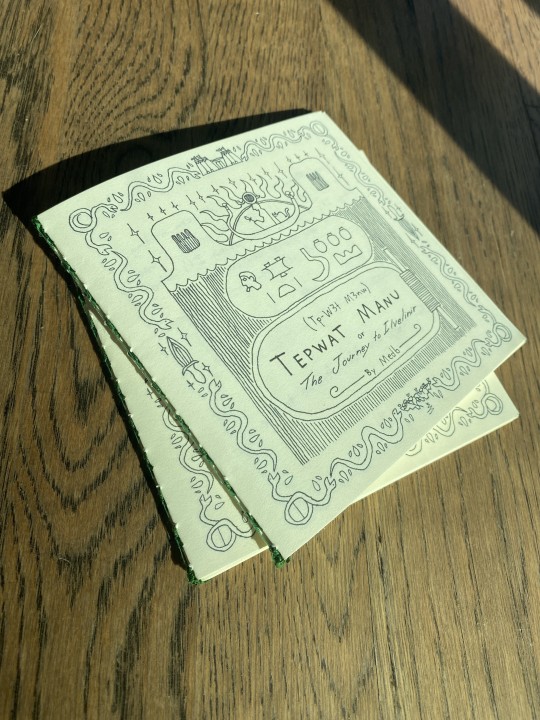

I just put together the first chapter of my book into a zine! The story is called "Tepwat Manu, or The Journey to Ilvelinir" The title comes from the middle Egyptian language. "Tepwat Manu" means something like "To Journey West." What I've posted here are some pictures of the finished product, and a selection of illustrations. The zine is 32 pages long. I hand-sewed the bindings with emerald embroidery floss and green thread. So far I've written 12 chapters. I'm going to post those on A03. If you go there and search "Tepwat Manu" you'll find the first one. When the book is finished, It will have about 30 chapters. The book is a fantasy story. The setting is inspired by the mythology of Ancient Egypt and Mesopotamia. It's about people who find themselves together journeying west - toward the setting sun - against the tyranny of death. I've been working on this for eight years. I'm super excited that it's come to a point where I can put something on the table. I hope you all think it's cool <3

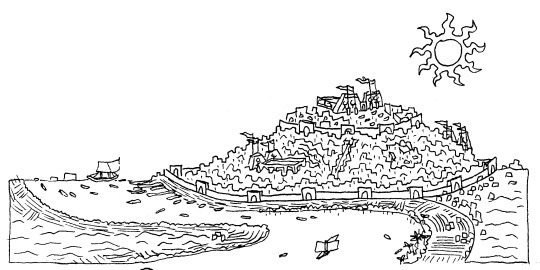

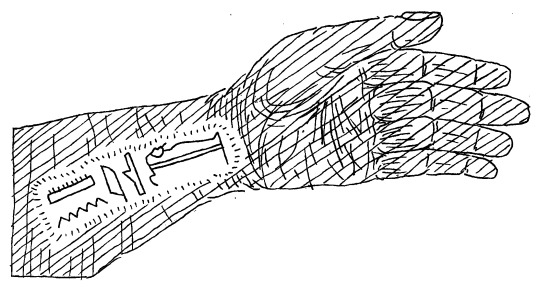

#My Art#My Writing#Ancient Egypt#Ancient Mesopotamia#Fantasy#Sorry Sydney Serena and Emma I think y'all are the only people who follow me on both insta and Tumblr and had to look at this post twice#lol
13 notes
·
View notes
Text
All this is from a painting I made for a friend of mine, I wanted to share.
I’m making this my pinned post, so here’s a link to my novel-in-progress - Tepwat Manu - a story about dying, set in fantasy-Ancient-Egypt. :)

FORMATTING FIXED SLIGHTLY I HOPE
This painting is in the center. The world tree is above, carrying the living Sun, Aten, and the Solar Barque is below, where the dead sun is carried on the head of Ra.
With that being said, I'd like to take this opportunity to remind everyone that this is a very fanciful representation of Egyptian cosmology. At no point in history would Egyptians have depicted the universe in this way (This is for my friend, after all, not for an egyptologist). I've pulled symbolism from sources as distant as perhaps 2000 years and 1000 miles. Such is Egyptian history that 2000 years doesn't even bring us near halfway through.

In this painting, my friend is the sun at the top of the tree. She is brilliant, and moves between worlds. Below, The skulls between the roots of the world tree are reminiscent of Osiris (mentioned previously), the god whose death nourishes the world.
Of all the sun gods there ever were in Egypt, I chose Aten as best, for like my friend he was subversive. (Aten was championed as the sole creator of the universe in opposition to Egyptian Orthodoxy).
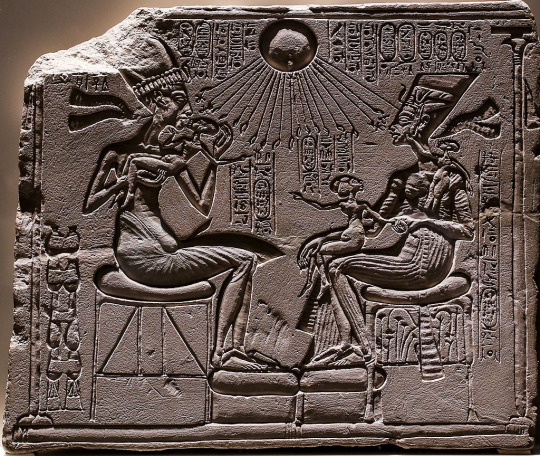
(This is the famous stele of Akhenaten and Nefertiti with their children. Aten is in the middle, but Nefertiti's daughter's finger points to the center of the composition.)
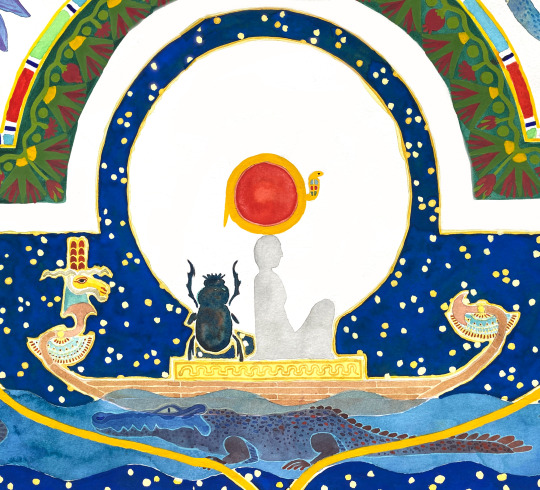
Further below, my depiction of the Solar barque comes from my favorite temple in Abydos. The ram-head on the stern is Khnum, the source of the Nile. The Scarab is Khepri, the morning sun. The mummy is my friend, sitting in the place of Ra, floating quietly through the halls of night toward the east to be reborn.
Rebirth is a theme which appears in most of the imagery I chose for this painting. Like The Lotus, which opens in the day and closes at night,
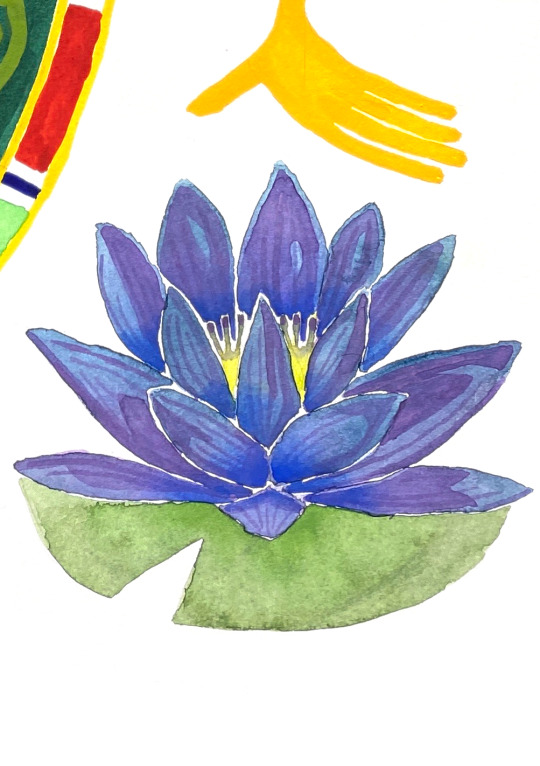
and like the Serpent Nehebkau, who was once an evil spirit, but who later became a protector,

both are symbols of rebirth, and a reminder that many of my friend's strengths were once a source of shame until her rebirth as a more self-actualized person. For example, her sexuality, symbolized here by the ancient Egyptian lettuce, was reborn to be a source of empowerment and liberation (look up the god Min, and his lettuce, for a good time).
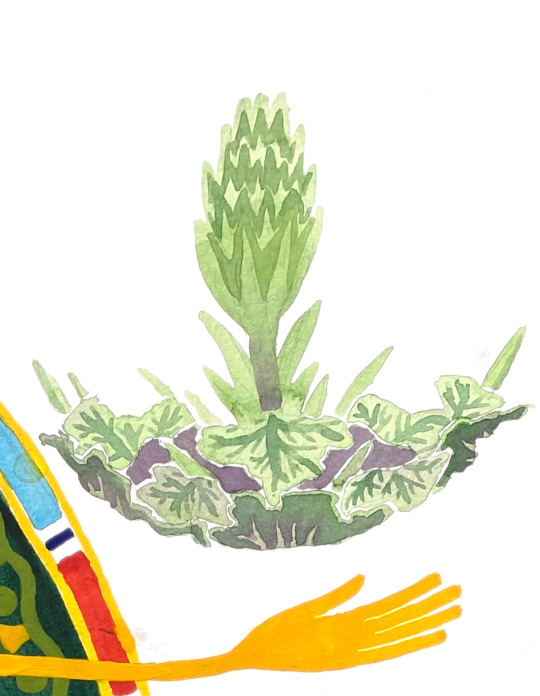
The Levant sparrowhawk is a bird which migrates northward out from Egypt. Its relevance to my friend's life is fairly heavy-handed. She left Egypt, and went north.
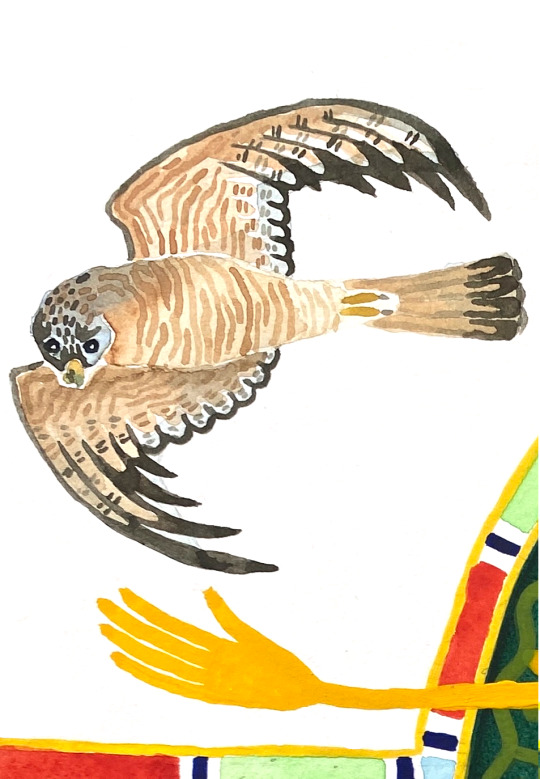
Finally, each of the fish in the river come from the Nile. From top left to bottom right, they are an elephant fish, a moonfish, a carp, a tilapia, a scorpion fish, and a puffer fish.

4 notes
·
View notes